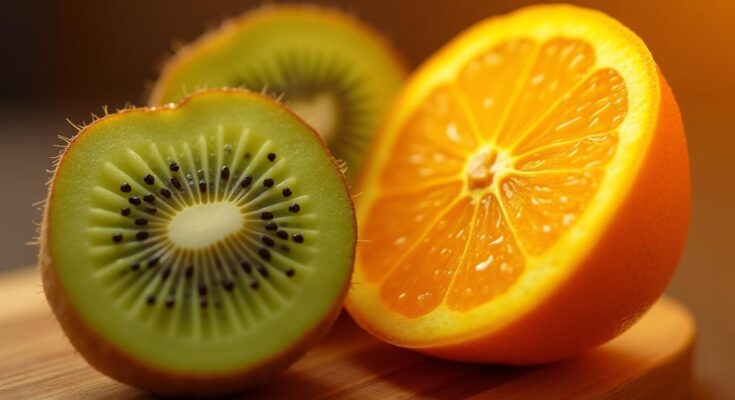When it comes to boosting your immune system and supporting overall health, Vitamin C is one of the most important nutrients you can include in your diet. While there are plenty of foods packed with Vitamin C, two fruits stand out as top contenders: the kiwi and the orange. But which one truly reigns supreme when it comes to Vitamin C content? In this post, we’ll dive deep into the nutritional profiles of both fruits, compare their Vitamin C content, and explore the health benefits each offers.
The Power of Vitamin C
Before we compare kiwis and oranges, let’s briefly talk about why Vitamin C is so essential for your health. Also known as ascorbic acid, Vitamin C plays a vital role in:
- Boosting immunity: Helps protect the body against infections and supports the production of white blood cells.
- Antioxidant properties: Fights free radicals that can damage cells, thus reducing inflammation and oxidative stress.
- Collagen production: Supports skin, cartilage, tendons, ligaments, and blood vessels, promoting healthy skin and wound healing.
- Iron absorption: Improves the body’s ability to absorb iron from plant-based sources.
How Much Vitamin C Do Kiwis and Oranges Contain?
Now, let’s look at the Vitamin C content in these two fruits.
- Kiwi: A medium-sized kiwi (about 100 grams) contains around 92 milligrams of Vitamin C, which is more than 100% of the recommended daily intake (RDI) for most adults.
- Orange: A medium-sized orange (about 130 grams) contains around 70 milligrams of Vitamin C, which is about 78% of the RDI for adults.
Comparison of Vitamin C Content per Serving
| Fruit | Serving Size | Vitamin C (mg) | Percentage of Daily RDI |
|---|---|---|---|
| Kiwi | 100 grams | 92 mg | 102% |
| Orange | 130 grams | 70 mg | 78% |
As you can see, kiwis pack more Vitamin C per 100 grams than oranges. In fact, kiwis have about 30% more Vitamin C than oranges, making them a powerful option for boosting your immune system.
Other Nutrients in Kiwi and Orange
While Vitamin C is the star nutrient in both fruits, they each offer additional health benefits due to their unique nutritional profiles.
Kiwi
- Fiber: Kiwi is a good source of dietary fiber, which helps support digestion and gut health.
- Potassium: A good source of potassium, essential for maintaining proper heart and muscle function.
- Antioxidants: Kiwi contains antioxidants like Vitamin E and polyphenols, which help reduce oxidative stress.
- Folate: This fruit is also rich in folate, an important B-vitamin that supports cell function and tissue growth.
Orange
- Fiber: Like kiwi, oranges are also a great source of fiber, which is important for digestive health.
- Potassium: Oranges provide a good amount of potassium, supporting heart health and electrolyte balance.
- Flavonoids: Oranges contain flavonoids, such as hesperidin, which have anti-inflammatory and antioxidant effects.
- Folate: Oranges are a good source of folate, beneficial for cell growth and regeneration.
Health Benefits of Eating Kiwi and Orange
Both kiwi and orange contribute significantly to your overall health, thanks to their abundance of Vitamin C and other nutrients.
Health Benefits of Kiwi
- Supports Immune Function: Thanks to its high Vitamin C content, kiwi can help strengthen your immune system and fight off infections.
- Improves Digestion: The fiber and enzymes in kiwi can help with digestion and prevent constipation.
- Promotes Skin Health: The antioxidants in kiwi support healthy skin by fighting free radicals and reducing wrinkles.
- Regulates Blood Pressure: Kiwi’s high potassium content can help lower blood pressure and reduce the risk of heart disease.
Health Benefits of Orange
- Boosts Immunity: Oranges are an excellent source of Vitamin C, which can help ward off illness and infections.
- Supports Cardiovascular Health: The fiber and flavonoids in oranges help reduce cholesterol levels and improve heart health.
- Promotes Skin Health: Oranges help prevent premature aging and promote healthy skin due to their antioxidant content.
- Reduces Inflammation: Oranges’ flavonoids and Vitamin C help reduce inflammation in the body.
Which is Better for You?
Both kiwi and orange are incredibly nutritious and can be part of a healthy diet. However, if you’re looking specifically for a fruit with the highest Vitamin C content per serving, kiwi takes the crown. But keep in mind that oranges are also an excellent choice, offering a refreshing, widely available option for Vitamin C and additional nutrients.
Conclusion
In the battle of kiwi vs. orange for Vitamin C supremacy, kiwi slightly edges out orange with its higher Vitamin C content per 100 grams. However, both fruits offer a wealth of other nutrients that are beneficial to overall health, including fiber, antioxidants, and potassium. The best choice ultimately depends on your preference and variety in your diet.
Whether you choose to enjoy a tangy kiwi or a sweet orange, both fruits are an excellent way to nourish your body and keep your immune system strong.
5 Engaging FAQs
- Is Kiwi or Orange better for boosting the immune system? Both fruits are excellent for immune support due to their high Vitamin C content. However, kiwi contains slightly more Vitamin C per serving, making it a top choice for immune health.
- Can I get enough Vitamin C from just one kiwi or one orange? Yes, eating one medium-sized kiwi or orange can provide you with more than enough Vitamin C for your daily requirements.
- Are there any other fruits that have more Vitamin C than kiwi? Yes, some fruits like acerola cherries, guava, and strawberries have even more Vitamin C than kiwi, but kiwi still ranks very high.
- Can I consume both kiwi and orange together in my diet? Absolutely! Both fruits can be enjoyed together in smoothies, fruit salads, or as a snack to maximize your Vitamin C intake.
- Are there any downsides to eating too much Vitamin C from fruits? While Vitamin C is water-soluble and excess amounts are typically excreted through urine, eating extremely large quantities of Vitamin C-rich fruits may cause stomach discomfort. Moderation is key.
By incorporating these nutritious fruits into your daily meals, you can ensure you’re getting a healthy dose of Vitamin C to support your well-being!



